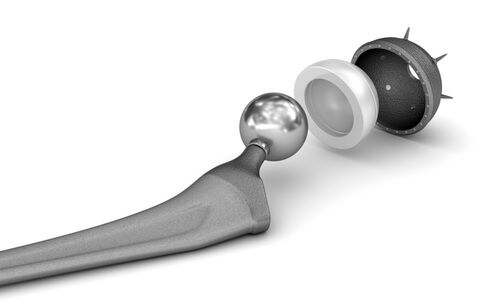
DePuy Pinnacle Hip Implant

Hip implant maker DePuy Orthopaedics has marketed multiple metal-on-metal hip implant systems that have come under fire from the U.S. Food and Drug Administration (FDA) and independent researchers. The Pinnacle Acetabular Cup System is among these devices.
The FDA says metal-on-metal artificial hips can cause pain, infection, bone fracture and tissue damage as well as dislocation of the implant and loss of mobility.
When the metal components of metal-on-metal hip implants rub against one another, they shed metal flakes or metal ions, the FDA reports. Metal flakes can destroy tissue around the artificial hip. This allows the hip to loosen and fail. Metal ions in the bloodstream can harm other parts of the body.
The lawyers at The Driscoll Firm, LLC, are investigating cases of artificial hip recipients who may have been injured by the Pinnacle Acetabular Cup System. If you or a loved one of yours has experienced painful side effects or injuries after receiving a DePuy Pinnacle hip, contact The Driscoll Firm, LLC, by phone or online to learn how we can help you.
Known Problems with Metal-On-Metal Hip Implants
An artificial hip in which the “ball and socket” of the hip joint are both made from metal is known as a “metal-on-metal hip.” DePuy Orthopaedics, a subsidiary of Johnson & Johnson, has been one of the largest makers of metal-on-metal hip implants.
The “acetabular cup” in an artificial hip is the socket of the ball-and-socket joint. The Pinnacle Acetabular Cup System involves implanting a metal head with a polyethylene (plastic) liner on the femur (upper leg bone), which then sits within the metal acetabular cup or “shell.”
DePuy introduced the Pinnacle Acetabular Cup System in the year 2000. The company announced in May 2013 that it would stop manufacturing it and other metal-on-metal artificial hips as of August 31, 2013.
In a January 2013 report announcing tighter FDA regulations for metal-on-metal hips, The New York Times said that the problems attributed to this type of hip implant represented “one of the biggest device-related failures in decades.”
Prior to that, in August 2010, Johnson & Johnson announced a worldwide recall of its DePuy ASR XL Acetabular System and ASR Hip Resurfacing System, both metal-on-metal hip implants.
But, as it withdrew those metal-on-metal hip implants from the market, Johnson & Johnson continued for three more years to sell the Pinnacle implant system and insist that it was safe.
The FDA, based on independent studies, says metal-on-metal hip implants can shed metal flakes and metal ions, which can cause:
- Pain and discomfort
- Tissue damage
- Infection
- Bone fracture or damage
- Dislocation of the device as damaged tissue weakens
- Difficulty walking as the hip implant fails.
In many cases, the solution to a failed Pinnacle Acetabular Cup System or another faulty metal-on-metal hip is surgery to remove the device and replace it with a traditional artificial hip made with ceramic components. In addition to the pain, discomfort and expense of this additional surgery, it puts the patient at risk of surgical complications, which can occur in any procedure.
Pinnacle Metal-on-Metal Hip Implant Patients’ Rights
If you believe that you received a faulty DePuy Pinnacle Acetabular Cup System metal-on-metal hip implant, you may have a right to seek compensation for your medical expenses as well as for your pain and suffering.
Medical device manufacturers have a legal obligation to test products before they are put on the market to ensure they are safe and effective when used as intended. If the product poses a risk, the manufacturer is required to notify consumers of any risks, complications and side effects the device is known to cause.
However, metal-on-metal hips were approved for the market by the FDA through a procedure that allowed manufacturers to forego submission of clinical test results and instead affirm that the new product was substantially equivalent to a previously approved device. The FDA discontinued this program, known as 501(k), for metal-on-metal hips in January 2013.
The FDA’s tighter regulations won’t help the estimated 500,000 patients who have already received metal-on-metal hip implants. Many of these patients can only hope to obtain relief by taking legal action.
Contact Our DePuy Pinnacle Hip Implant Lawyers
The Driscoll Firm, LLC, is investigating injury claims arising from receipt of the Pinnacle Acetabular Cup System metal-on-metal hip implant. If you or a loved one has experienced pain or other problems after receiving a DePuy Pinnacle hip implant, The Driscoll Firm, LLC, lawyer may be able to help you to obtain compensation for your medical expenses, lost income, pain and suffering and more.
The Driscoll Firm, LLC, has a record of representing clients injured by dangerous medical devices. John J. Driscoll is among less than 1 percent of American lawyers accepted to the Million Dollar Advocates Forum and the Multi-Million Dollar Advocates Forum, which limit membership to lawyers who have obtained million-dollar and multimillion-dollar verdicts and settlements.
Call us today or contact us online to speak to a DePuy Pinnacle hip implant litigation attorney about how our litigation experience can help you.
For more information:
- Metal-on-Metal Hip Implants, U.S. Food and Drug Administration
- F.D.A. Seeks to Tighten Regulation of All-Metal Hip Implants, The New York Times
- J.&J. Unit Phasing Out All-Metal Hip Devices, The New York Times
- DePuy Orthopaedics, Inc. Statement on Discontinuation of ULTAMET® Metal-on-Metal and COMPLETE™ Ceramic-on-Metal Hip Systems







